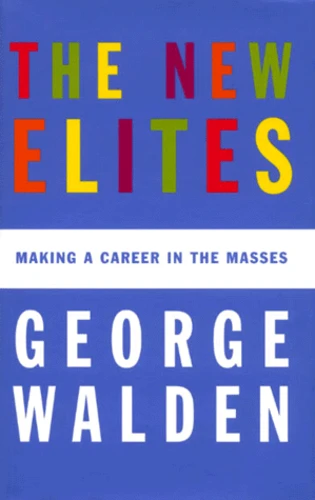The New Elites. Making A Career In The Masses
Par :Formats :
- Paiement en ligne :
- Livraison à domicile ou en point Mondial Relay indisponible
- Retrait Click and Collect en magasin gratuit
- Nombre de pages210
- PrésentationRelié
- Poids0.4 kg
- Dimensions14,4 cm × 22,3 cm × 2,3 cm
- ISBN0-7139-9317-0
- EAN9780713993172
- Date de parution15/11/2000
- ÉditeurAllen Lane
Résumé
In the brave new classless Britain we keep hearing about, elites - an affront to the democratic conscience - have been declared surplus to requirements. Everywhere you look self-interested social cliques are giving way to enlightened meritocrats, as men and women of the people make public policy and set the cultural tone. Finally we are becoming a representative democracy in the full sense of the word. Henceforth all is for the best in our more equal, more compassionate and more sharing world.
Except it isn't. In a controversial reassessment, George Walden argues that elites are perennial. What matters is who they are, and ours is the first era where ruled by elites in disguise. Far from being , or a functioning meritocracy, Britain is dominated by oligarchies of professional egalitarians. Their power bases, like those of the old elites, lie in education, the media, culture, politics and commerce, but their behaviour is radically different. Unlike more benign Establishments of Left and Right in the postwar period, their aim is not to raise popular aspirations but to exploit mass taste, mass gullibility or mass spending power to their own advantage. Though of course it is all done piously, priggishly, in the sacred the People.
The new elites make play with an outdated up/down society, the better to portray themselves as on the side of virtue, which is to say, of the anti-elitists. Worst of all, they encourage the culture of condescension, all too visible in our politics, our media arts. We should never confuse the popular with list. 'Populism implies a manipulation from above and a disdain for the manipulated. It is a perversion of democracy, the sickness of the age.' For elites populism is a means to power, wealth and self-advancement and, of course, behind their anti-elitist rhetoric lies the old urge to dominate. For the less fortunate masses, bread and circuses are once again deemed enough.
In a performance as witty as it is merciless, Walden unmasks the new elites, a class whose ambitions for social control rival their aristocratic forebears, whose populism is as damaging to democracy - and whose final affront to society is to deny that they exist.
In the brave new classless Britain we keep hearing about, elites - an affront to the democratic conscience - have been declared surplus to requirements. Everywhere you look self-interested social cliques are giving way to enlightened meritocrats, as men and women of the people make public policy and set the cultural tone. Finally we are becoming a representative democracy in the full sense of the word. Henceforth all is for the best in our more equal, more compassionate and more sharing world.
Except it isn't. In a controversial reassessment, George Walden argues that elites are perennial. What matters is who they are, and ours is the first era where ruled by elites in disguise. Far from being , or a functioning meritocracy, Britain is dominated by oligarchies of professional egalitarians. Their power bases, like those of the old elites, lie in education, the media, culture, politics and commerce, but their behaviour is radically different. Unlike more benign Establishments of Left and Right in the postwar period, their aim is not to raise popular aspirations but to exploit mass taste, mass gullibility or mass spending power to their own advantage. Though of course it is all done piously, priggishly, in the sacred the People.
The new elites make play with an outdated up/down society, the better to portray themselves as on the side of virtue, which is to say, of the anti-elitists. Worst of all, they encourage the culture of condescension, all too visible in our politics, our media arts. We should never confuse the popular with list. 'Populism implies a manipulation from above and a disdain for the manipulated. It is a perversion of democracy, the sickness of the age.' For elites populism is a means to power, wealth and self-advancement and, of course, behind their anti-elitist rhetoric lies the old urge to dominate. For the less fortunate masses, bread and circuses are once again deemed enough.
In a performance as witty as it is merciless, Walden unmasks the new elites, a class whose ambitions for social control rival their aristocratic forebears, whose populism is as damaging to democracy - and whose final affront to society is to deny that they exist.

